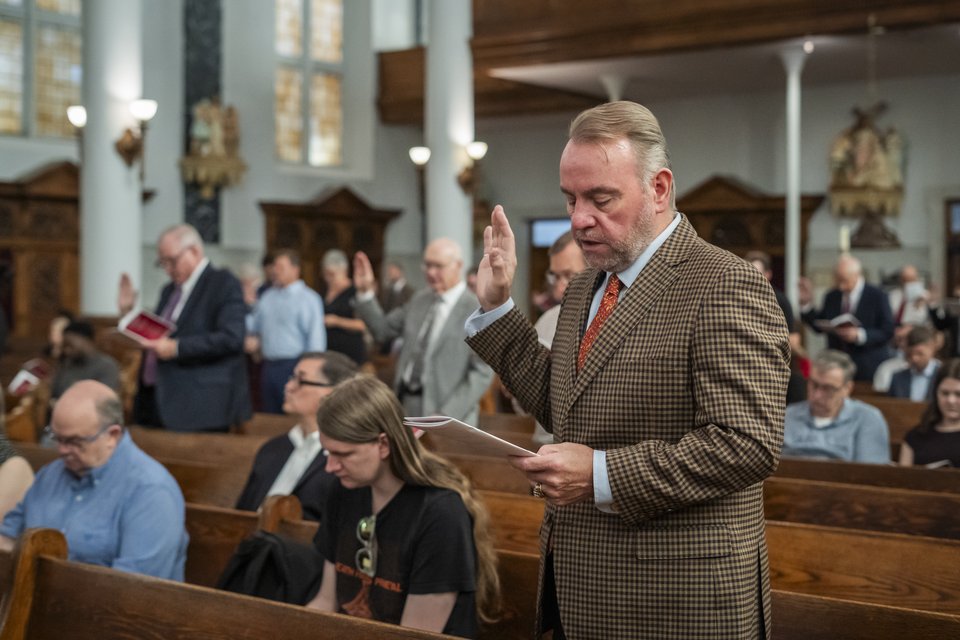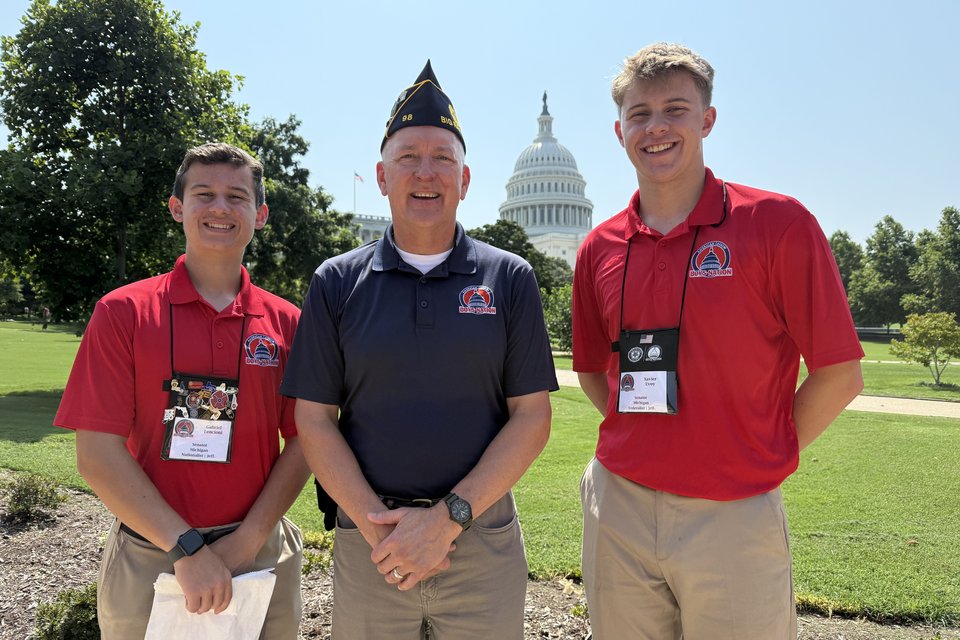God's justice is 'a deeper level of justice' that seeks reconciliation above all, priest tells judges, lawyers at SS. Peter and Paul
DETROIT — God’s notion of justice goes deeper than man’s notion of justice, and when lawyers, judges, law professors and law students contemplate God’s justice, they better serve the community.
Fr. Joseph Daoust, SJ, a professor at the University of Detroit Mercy Law School, told the legal community gathered for the Red Mass on Sept. 17 at SS. Peter and Paul (Jesuit) Church in Detroit that the Gospel message brings about justice, but justice in the divine sense goes beyond the law and focuses on reconciliation.
“When we talk about justice to an American on the street, they might say something about fairness, about equality before the law, due process, and might talk about getting what you deserve, either good or bad,” Fr. Daoust said. “All of this is based on our life with American philosophy, with everything centered on the individual. But this notion of biblical justice is not centered on individual rights, but instead is going to be part of God’s plan to have right relationships and restored relationships.”
The 112th annual Red Mass was an opportunity for the Detroit legal community to come together in prayer as the judicial term and academic year begins.
Fr. Daoust asked the community gathered to ponder what the Gospel says a truly just society looks like.
“What’s this relationship between justice and peace?” Fr. Daoust said. “How is justice really creating peace? I think Scripture goes to a deeper level of justice here. We all want to live in a world of peace, of justice. There is a wonderful passage in Isaiah about how on the holy mountain, when peace finally comes, the lamb will lie down with the lion.
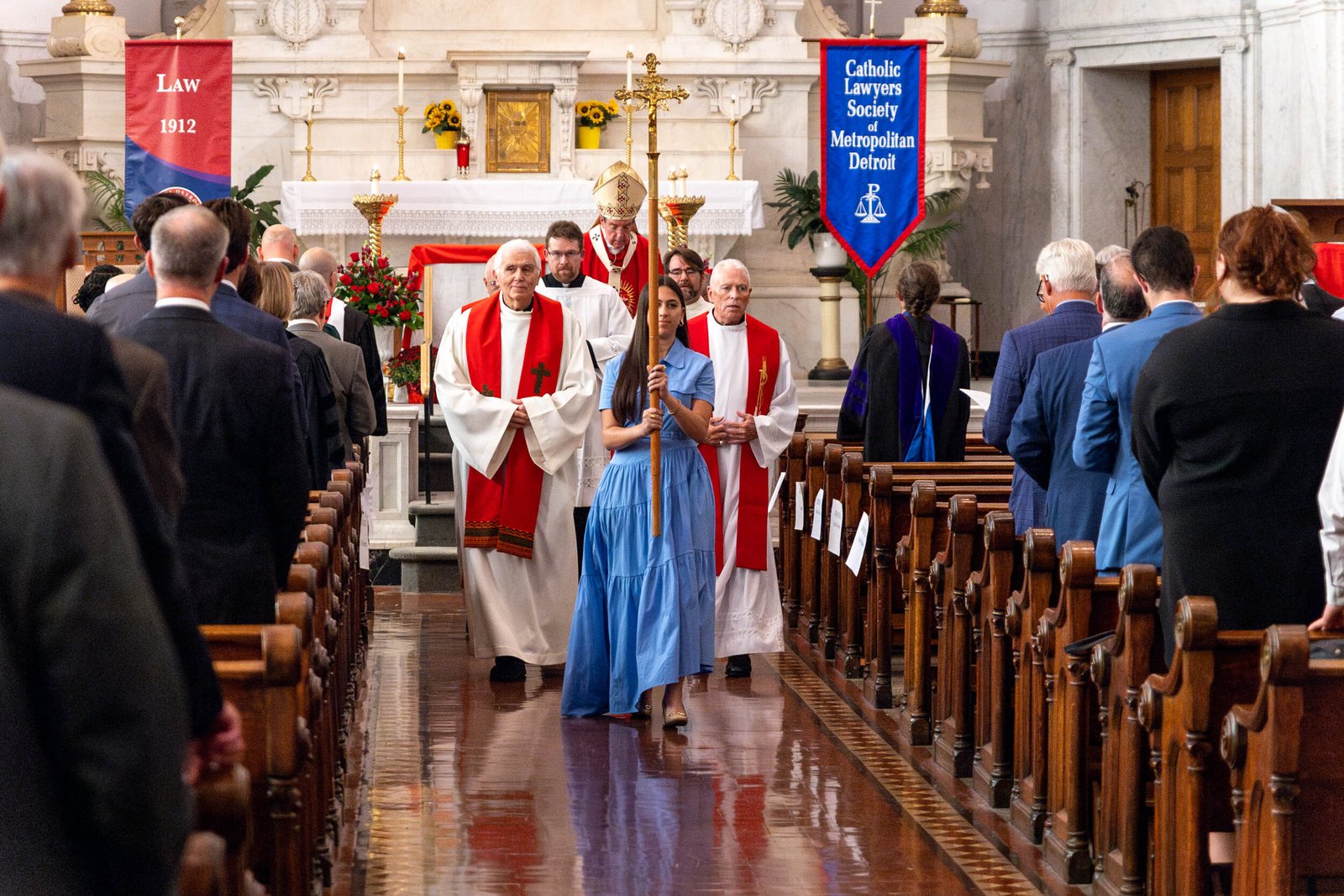
“One of the prophets of our deconstructive age, Woody Allen, once said, ‘The lion may lay down with the lamb, but the lamb isn’t going to get much sleep,'” Fr. Daoust joked.
The Red Mass dates back to 1877 when the Society of Jesus came to Detroit to establish Detroit College and celebrated Mass at SS. Peter and Paul, Detroit’s former cathedral, which was gifted to the Jesuits by Bishop Casper H. Borgess of Detroit.
The School of Law continued the tradition when it opened in 1912 and has hosted the Red Mass every year since, making it the longest consecutive running Mass for the legal community in the country.
“Just five weeks ago, we welcomed the 112th class of law students right here at orientation in this sanctuary,” said Nicholas Schroeck, interim dean and associate professor of law at the University of Detroit Mercy School of Law. “I challenged our students to live our school’s mission as they work to gain and perfect the skills that will make them complete lawyers and be ministers of justice. I also encourage our students to be their authentic selves when discussing and debating, professionally and peacefully, the issues of the day.”
The first record of a Mass for the legal community was in 1245 in Paris, and for many centuries was said in the chapel of the Order of Advocates, La Sainte Chapelle, which was built by King Louis IX of France.
The tradition made its way in England in 1310 during the reign of Edward I, where the entire bench and bar of the court would attend Mass at the opening of each court, asking for the intercession of the Holy Spirit, for which red vestments were worn.
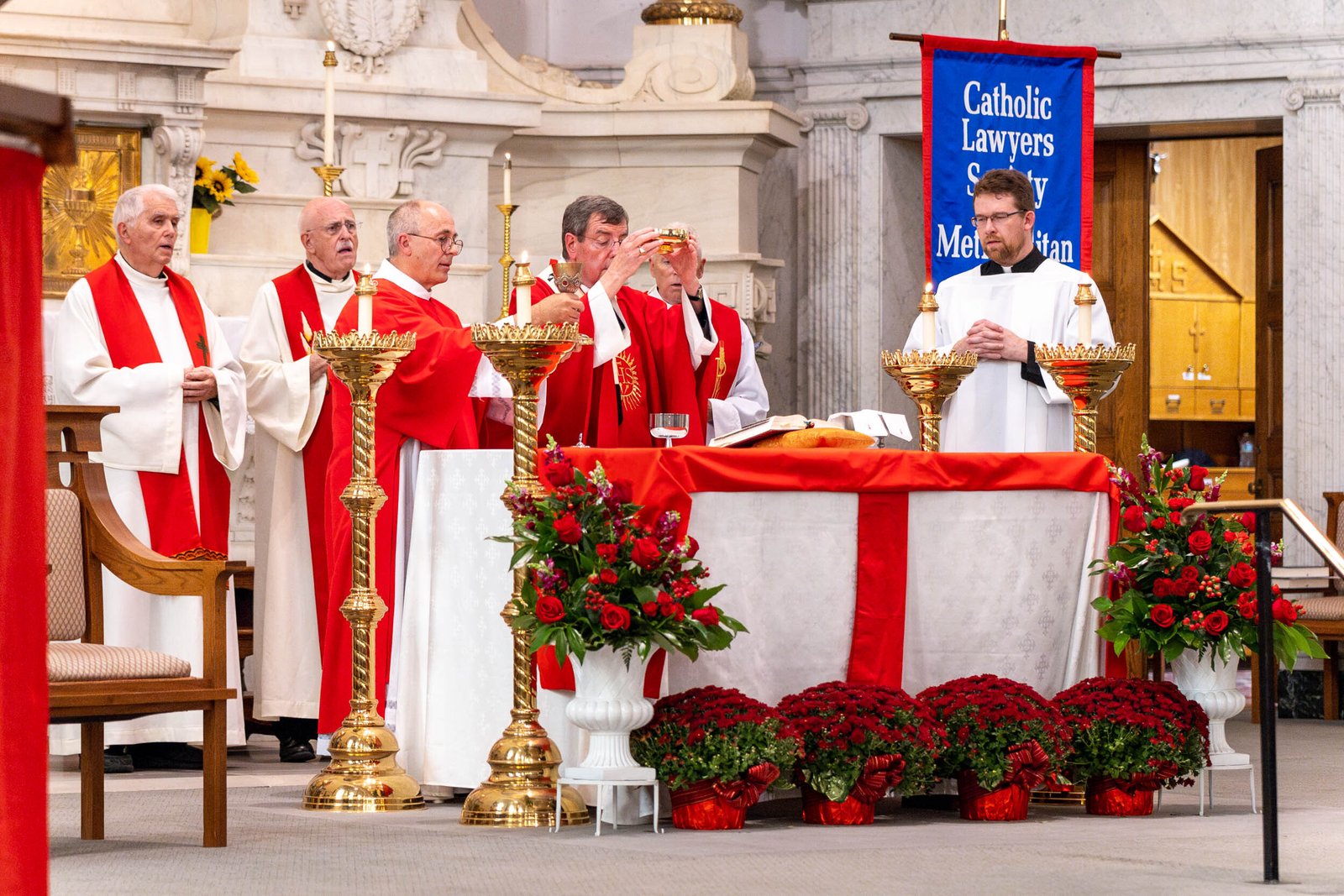
The judges and doctors of the law during King Edward’s reign wore red robes, so the Mass became known as the “Red Mass.”
Detroit Archbishop Allen H. Vigneron was the principal celebrant of the Mass and told the legal community gathered that the work they do in administering, practicing, teaching and learning the law makes them cooperators in God’s vision of justice.
“It’s the Church’s tradition that what you do in service of the law is a service to God Himself because He is the principal lawgiver,” Archbishop Vigneron said. “It is a great honor for me to be with you, invoking the Holy Spirit for the work you do to make human law a reflection of divine law.”
Fr. Daoust’s homily reflected on the Mass readings from Isaiah on how God’s justice will bring about peace on earth, and the parable of the Prodigal Son according to St. Luke’s Gospel.
Fr. Daoust said the parable of the Prodigal Son used to comfort him because he saw himself as the younger son, who left his father, became destitute, and upon returning home, was instantly forgiven.
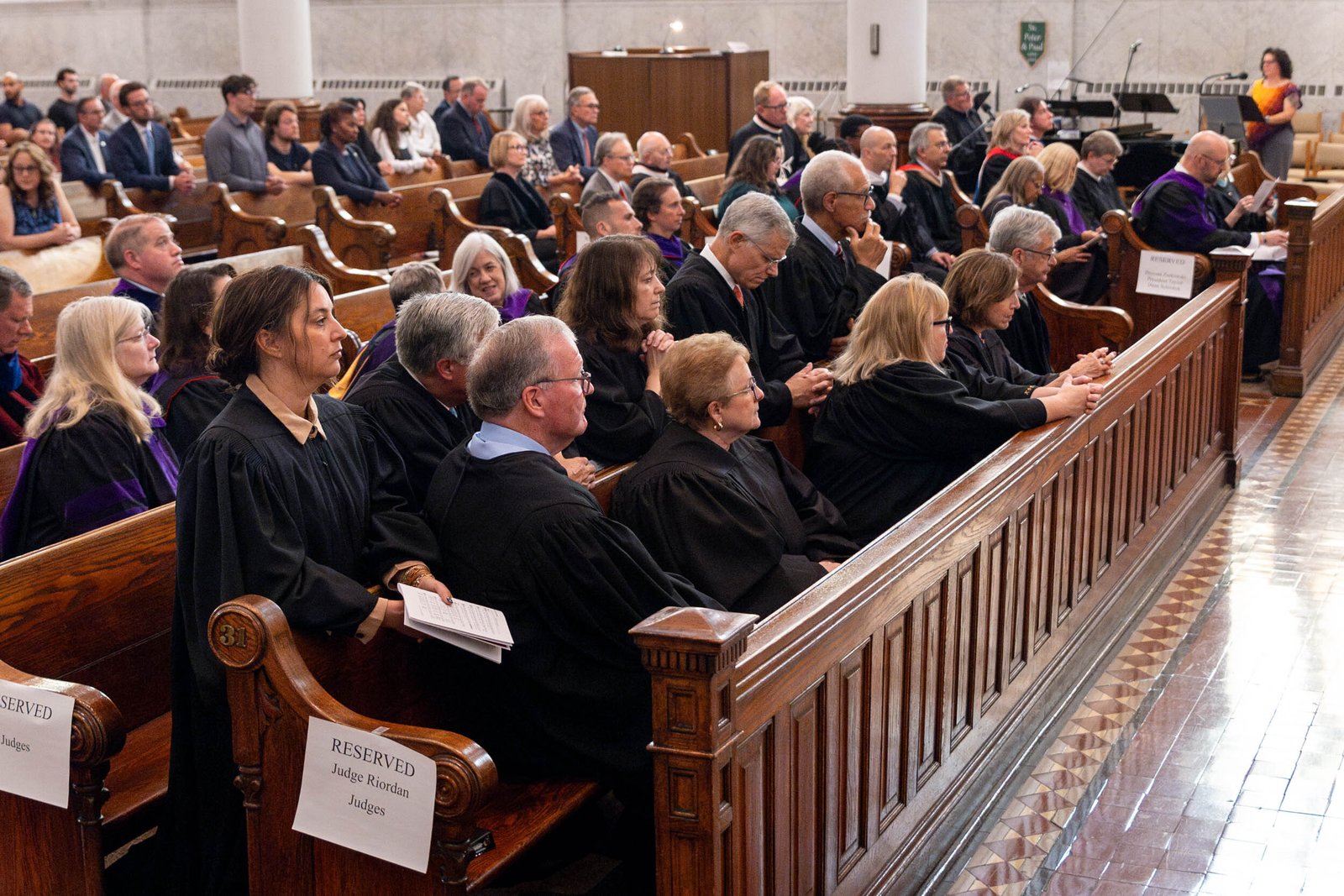
But that was not the message Jesus was trying to get across, Fr. Daoust said, recalling that he told the parable after he heard scribes and Pharisees complaining Jesus was associating with known sinners.
“The key figure(s) Jesus is speaking to is the Pharisees,” Fr. Daoust said. “The point he is trying to make is not about the younger son, the one who ran away and came crawling back. No, it’s the elder son, the one in the field who has worked, slaved, as he said, all these years.
“When the time comes for there to be reconciliation in this family, something his father in the parable, who represents God, severely wants, and the older son can’t forgive the younger son,” Fr. Daoust explained.
Fr. Daoust said on the surface, it appears the elder son — the one who stayed by his father’s side, did what was asked of him and fulfilled his obligations — was the just man, but in God’s vision of justice, it is the older son who is the least just.
“Justice isn’t always just doing all the right things; there is a deeper level,” Fr. Daoust said. “There is a place in Isaiah where the Lord declares, ‘My thoughts are not your thoughts, neither are your ways, My ways. As heavens are higher than the earth, so My thoughts higher than yours.’”
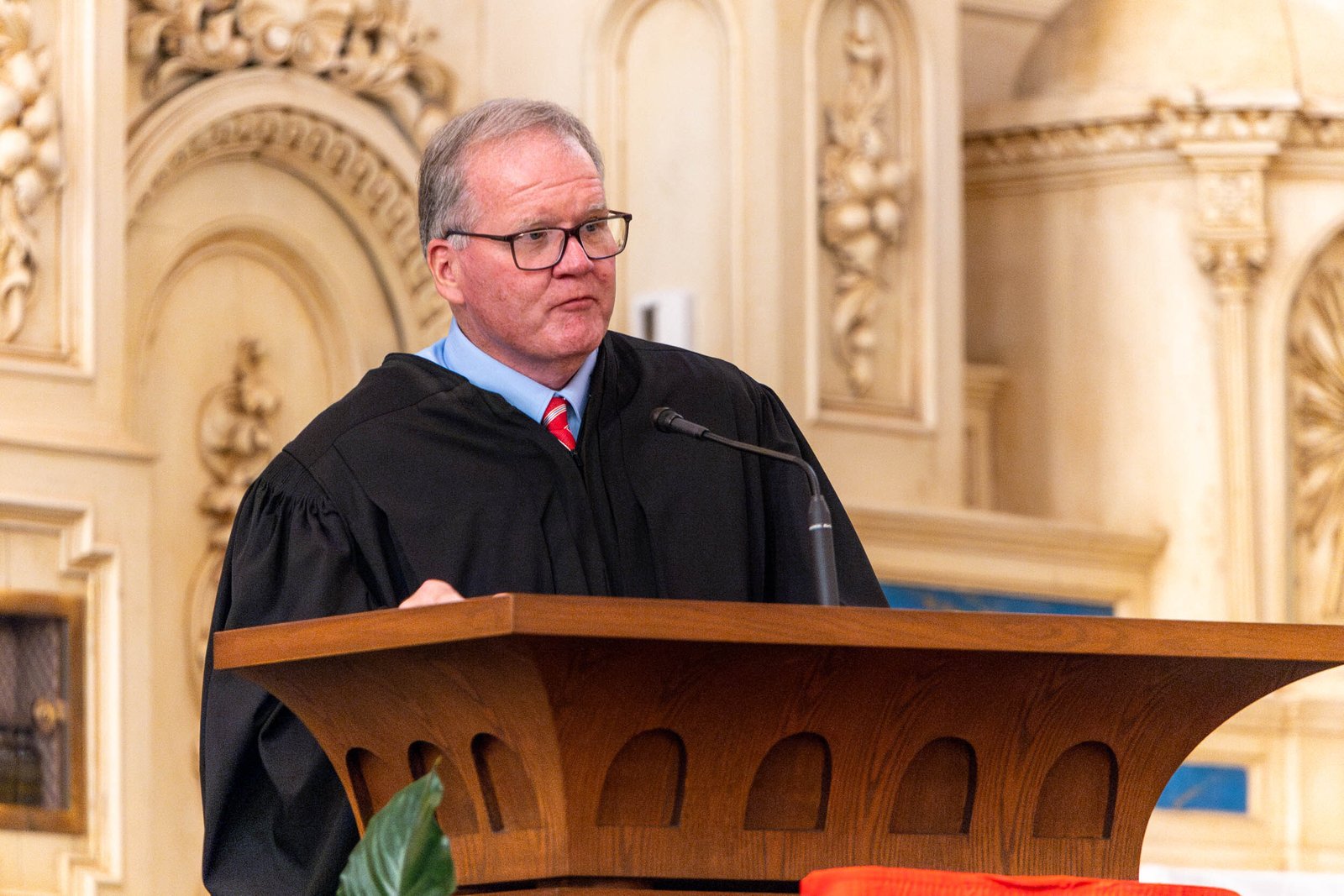
Fr. Daoust said the role of judges, lawyers, law professors and law students is to go beyond the letter of the law when striving for justice and to look through the eyes of God to what will bring true justice: reconciliation.
“Our vocation for all of us as human beings is to delight in God as much as we can, and that spark of divinity in us is (that) we are made in the image and likeness of God,” Fr. Daoust said. “So how does God view justice? God reconciles, God loves, God goes beyond fairness, goes beyond punishment, goes beyond our notion of what justice is. God’s notion of reconciliation means we have to reach out to one another, to restore relationship with one another.”
At the end of Mass, Judge Michael J. Riordan of the Michigan Court of Appeals, a 1990 graduate of the Detroit Mercy School of Law, led the legal community in a renewal of the lawyers’ oath of commitment, where the legal community promises to uphold the law, seek the truth, defend their clients’ interest and pursue their vocations with virtue and integrity.
“In 1987, 37 years ago, I was in the 9 a.m. class with Fr. Daoust, about a month into law school, and I was thinking to myself, ‘What am I doing here?'” Judge Riordan said. “I was in this church, seeing all these lawyers and judges getting ready to renew their commitment, and I was thinking, 'There is no way on God’s green earth I’ll be standing here taking an oath.' Hard to believe, but with God’s grace, I’m here, renewing this oath as they did all those years ago.”
Copy Permalink
Faithful citizenship



